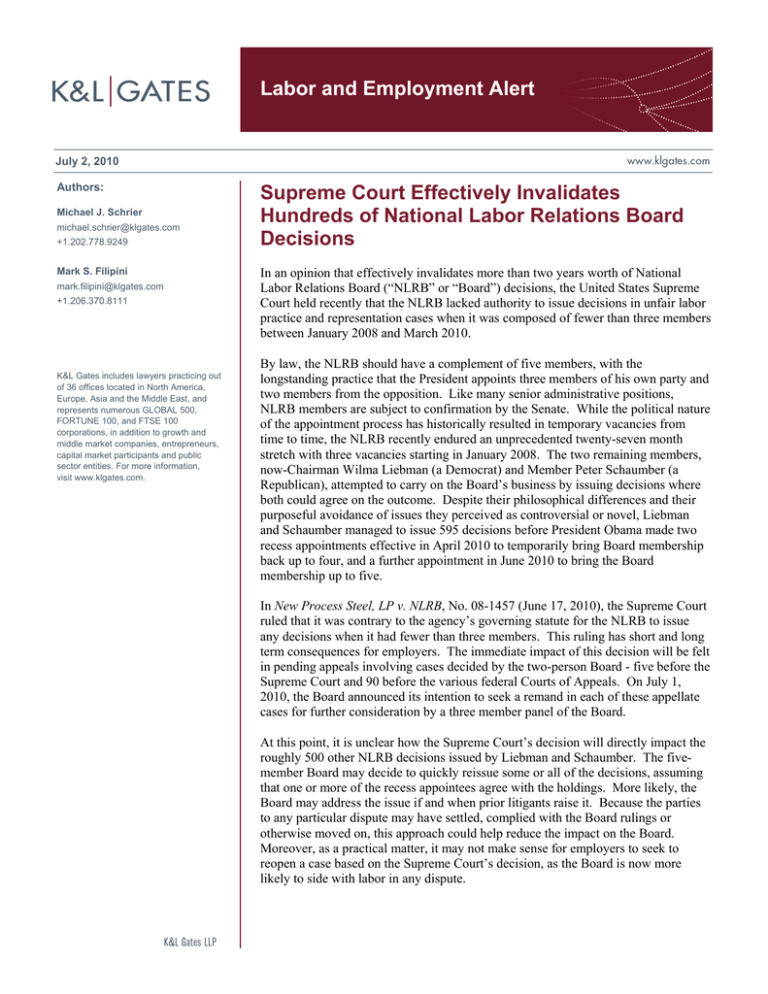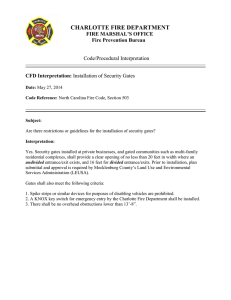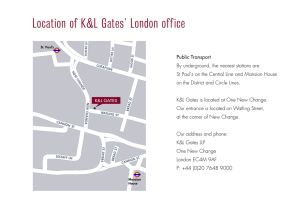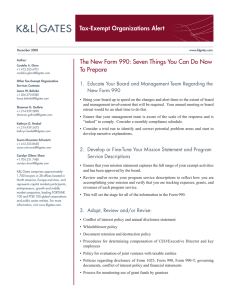
Labor and Employment Alert
July 2, 2010
Authors:
Michael J. Schrier
michael.schrier@klgates.com
+1.202.778.9249
Mark S. Filipini
mark.filipini@klgates.com
+1.206.370.8111
K&L Gates includes lawyers practicing out
of 36 offices located in North America,
Europe, Asia and the Middle East, and
represents numerous GLOBAL 500,
FORTUNE 100, and FTSE 100
corporations, in addition to growth and
middle market companies, entrepreneurs,
capital market participants and public
sector entities. For more information,
visit www.klgates.com.
Supreme Court Effectively Invalidates
Hundreds of National Labor Relations Board
Decisions
In an opinion that effectively invalidates more than two years worth of National
Labor Relations Board (“NLRB” or “Board”) decisions, the United States Supreme
Court held recently that the NLRB lacked authority to issue decisions in unfair labor
practice and representation cases when it was composed of fewer than three members
between January 2008 and March 2010.
By law, the NLRB should have a complement of five members, with the
longstanding practice that the President appoints three members of his own party and
two members from the opposition. Like many senior administrative positions,
NLRB members are subject to confirmation by the Senate. While the political nature
of the appointment process has historically resulted in temporary vacancies from
time to time, the NLRB recently endured an unprecedented twenty-seven month
stretch with three vacancies starting in January 2008. The two remaining members,
now-Chairman Wilma Liebman (a Democrat) and Member Peter Schaumber (a
Republican), attempted to carry on the Board’s business by issuing decisions where
both could agree on the outcome. Despite their philosophical differences and their
purposeful avoidance of issues they perceived as controversial or novel, Liebman
and Schaumber managed to issue 595 decisions before President Obama made two
recess appointments effective in April 2010 to temporarily bring Board membership
back up to four, and a further appointment in June 2010 to bring the Board
membership up to five.
In New Process Steel, LP v. NLRB, No. 08-1457 (June 17, 2010), the Supreme Court
ruled that it was contrary to the agency’s governing statute for the NLRB to issue
any decisions when it had fewer than three members. This ruling has short and long
term consequences for employers. The immediate impact of this decision will be felt
in pending appeals involving cases decided by the two-person Board - five before the
Supreme Court and 90 before the various federal Courts of Appeals. On July 1,
2010, the Board announced its intention to seek a remand in each of these appellate
cases for further consideration by a three member panel of the Board.
At this point, it is unclear how the Supreme Court’s decision will directly impact the
roughly 500 other NLRB decisions issued by Liebman and Schaumber. The fivemember Board may decide to quickly reissue some or all of the decisions, assuming
that one or more of the recess appointees agree with the holdings. More likely, the
Board may address the issue if and when prior litigants raise it. Because the parties
to any particular dispute may have settled, complied with the Board rulings or
otherwise moved on, this approach could help reduce the impact on the Board.
Moreover, as a practical matter, it may not make sense for employers to seek to
reopen a case based on the Supreme Court’s decision, as the Board is now more
likely to side with labor in any dispute.
Labor and Employment Alert
However, the tactical calculus could be different for
an employer deferred back to an administrative law
judge by the two-member Board for further
proceedings. The bottom line is that employers
affected by any of the two-member rulings should
engage in a careful analysis of the facts and legal
issues in their particular case(s) to sort through the
issues and opportunities raised by New Process
Steel.
Court has likely eliminated all precedential value in
the 595 two-member NLRB decisions issued by
Liebman and Schaumber. More importantly, in
light of the frequent difficulties with the political
appointment and confirmation process, it is possible
that the NLRB could again become temporarily
incapable of issuing new opinions due to a lack of
members in the future based on the New Process
Steel decision.
In terms of the potential long term consequences,
employers should assume for now that the Supreme
Anchorage Austin Beijing Berlin Boston Charlotte Chicago Dallas Dubai Fort Worth Frankfurt Harrisburg Hong Kong London
Los Angeles Miami Moscow Newark New York Orange County Palo Alto Paris Pittsburgh Portland Raleigh Research Triangle Park
San Diego San Francisco Seattle Shanghai Singapore Spokane/Coeur d’Alene Taipei Tokyo Warsaw
Washington, D.C.
K&L Gates includes lawyers practicing out of 36 offices located in North America, Europe, Asia and the Middle East, and represents numerous
GLOBAL 500, FORTUNE 100, and FTSE 100 corporations, in addition to growth and middle market companies, entrepreneurs, capital market
participants and public sector entities. For more information, visit www.klgates.com.
K&L Gates is comprised of multiple affiliated entities: a limited liability partnership with the full name K&L Gates LLP qualified in Delaware and
maintaining offices throughout the United States, in Berlin and Frankfurt, Germany, in Beijing (K&L Gates LLP Beijing Representative Office), in
Dubai, U.A.E., in Shanghai (K&L Gates LLP Shanghai Representative Office), in Tokyo, and in Singapore; a limited liability partnership (also named
K&L Gates LLP) incorporated in England and maintaining offices in London and Paris; a Taiwan general partnership (K&L Gates) maintaining an
office in Taipei; a Hong Kong general partnership (K&L Gates, Solicitors) maintaining an office in Hong Kong; a Polish limited partnership (K&L
Gates Jamka sp. k.) maintaining an office in Warsaw; and a Delaware limited liability company (K&L Gates Holdings, LLC) maintaining an office in
Moscow. K&L Gates maintains appropriate registrations in the jurisdictions in which its offices are located. A list of the partners or members in each
entity is available for inspection at any K&L Gates office.
This publication is for informational purposes and does not contain or convey legal advice. The information herein should not be used or relied upon
in regard to any particular facts or circumstances without first consulting a lawyer.
©2010 K&L Gates LLP. All Rights Reserved.
July 2, 2010
2






